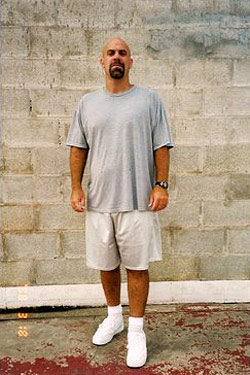
A few days earlier in the prison yard at the Federal Correctional Institution in Butner, North Carolina, Rosso had handed Madoff a list of questions, and the most famous financial criminal in the world had agreed to write out his responses. “I’m not a journalist,” Rosso told me, but he knew he had a story. Then, suddenly, my communication with Rosso stopped. I soon learned that prison officials had thrown him in the hole — solitary confinement — for conducting the interview.
I’d first become acquainted with Rosso while researching stories on Bernard Madoff. Other convicts had provided me with information that turned out to be little more than prison rumors. Rosso, though, didn’t strike me as just another hustler. For one thing, Madoff seemed to enjoy his company. It had been Rosso who passed Madoff a letter from me, and when Madoff asked for a reference, Rosso had vouched for my credibility. Later Madoff made clear to me by phone that he trusts Rosso.
Theirs was certainly an unlikely friendship. Madoff had been worth $1 billion before prison, and owned a series of homes and boats. Rosso had for years done hard time in maximum-security penitentiaries where he led a gang, ran a gambling operation, organized a drug ring, and kept up a heroin and alcohol habit, he said. Then he was diagnosed with bladder cancer and transferred to FCI Butner, which has a medical facility, and where he sometimes walked the track with Madoff. At Butner, Rosso had turned his life around. He’d become a writer, which he says keeps him sober and out of trouble. He’s posted the beginning of a memoir on gorillainc.com.
Rosso found Madoff approachable. “When I went out to the recreation yard and met Bernie for the very first time,” he wrote me, “I realized that … Bernie was normal. He didn’t act like some kind of uppity, nose-in-the-air rich guy. He was a very friendly, down-to-earth kind of guy.”
The writer in Rosso knew that in Madoff he had a dynamite subject, one sure to garner attention for his writing. Online, he became Madoff’s defender and explainer. Madoff had long promised Rosso his first interview, but following the suicide of Madoff’s oldest son, Rosso hadn’t pressed the point. Then Rosso was notified that he was being transferred — prison officials apparently feared that he’d attack a new inmate to avenge a friend. And so, feeling a sudden urgency, Rosso handed Madoff a dozen questions one day in the prison yard. A couple of days later, Madoff handed him written responses, which Madoff later confirmed to me by phone.
Late in January I learned that Rosso had been let out of the hole, and he got me a message. He still wanted me to publish the interview — he has a journalist’s instincts. It is an interesting interview. In it, Madoff is blunt and straightforward, which is characteristic of him these days. Rosso had long enjoyed talking to Madoff, in part, because he didn’t focus on the usual inmate obsessions: “Bitches and hos, drugs, guns, violence, crime, trailer park trash, gangs, prison politics, rap, and a bunch of other nonsense,” as Rosso put it. Madoff liked to chat about credit default swaps, the housing bubble, the struggling economy. And so in the interview, Madoff, as if still an oracle of Wall Street, offers opinions on financial reform, Volcker, Geithner. Financial reform “was so watered down that it did little to prevent similar problems in the future,” Madoff wrote. He also wrote about his remorse for his victims, and his feelings about his wife, and his son’s death. Rosso saved his zinger for the final question. “Was it worth it?” he asked. “I destroyed a legacy that was created by my brother and sons that took 50 years to build. Nothing could be worth this,” Madoff answered.
Robert Rosso’s interview with Madoff will published on his blog, robertrosso.wordpress.com.